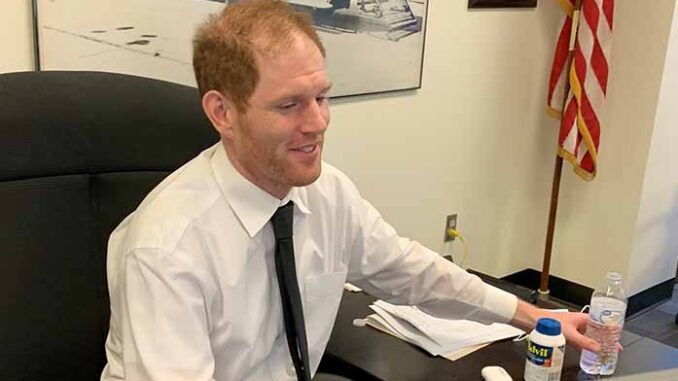
Maricopa County Recorder Stephen Richer is upset that the court pointed out that signature verification procedures set forth by Katie Hobbs in 2019 when she was secretary of state don’t match the law. Richer alleges that will mean more work.
Richer took to the press to unburden his woes. The county recorder, beset by an unrelenting public scrutiny of election procedures that he translates into constant threats to democracy, told ABC 15 that his office would have to take the extra pains to follow the letter of the law.
“If I had to guess I would say it would result in a lot more curing, meaning we would need to contact the voters and say, hey, your signature doesn’t look like the now only one signature that we have on file for you, that might be from forty of fifty years ago,” Richer said.
The additional responsibility for county recorders became clear after Yavapai County Superior Court Judge John Napper declared in ruling last week that the 2019 Election Procedures Manual (EPM) by Hobbs “create[d] a process that contradicts” the law. That ruling rejected Secretary of State Adrian Fontes’ motion to dismiss an Arizona Free Enterprise Club lawsuit alleging that Fontes’ interpretation and enforcement of signature verification law, which aligned with that of Hobbs, did not match the actual statute’s language.
In response to Napper’s ruling, the press raised alarm among voters in its coverage featuring Richer. Arizonans were warned their early vote may not count because election officials would be required to verify signatures using registration records only, versus signatures from other documents or past ballots. Echoing Richer, their reporting speculated signatures could be rejected en masse due to the signature on file being an older variation, or warped by MVD digitization.
That means for two major elections, an unlawful signature verification process was enforced. Napper reminded Secretary of State Adrian Fontes that he has a “non-discretionary duty” to properly instruct county recorders on lawful vote tabulation.
“[Hobbs’ 2019 EPM] contains an incorrect definition of registration record as does advice from the Secretary of State as alleged in the Complaint. This incorrect definition and instruction currently carry the weight of the law,” said Napper. “As long as the 2019 EPM remains in effect, there is an active and actual controversy between adversaries.”
Much like his predecessor and party peer, Fontes contended that the term “registration record” could mean whatever he wanted it to mean. According to Napper’s rejection of Fontes’ motion to dismiss, Fontes told the court that he wanted “registration record” to mean “all sorts of signed documents in the voter’s history even if they have nothing to do with the act of registering.”
This aversion to the strict adherence of the law presents a paradox: under Fontes’ desired meaning of the term “registration record,” which Richer wants to uphold, election officials would, theoretically, need to take the time to carefully review all signatures ever provided by a voter. If that were to be done, that would take more time and effort than comparing signatures existing within a voter’s registration document(s).
Application of the Hobbs EPM signature verification process has resulted in inconsistent outcomes over the years.
While signature rejection rates skyrocketed under Richer using the Hobbs EPM in Maricopa County, they hardly moved under Fontes. Both resulted in scrutiny, with former Attorney General Mark Brnovich declaring that Fontes was less diligent in application of signature review, and that the entire signature verification system was “insufficient to guard against abuse.”
